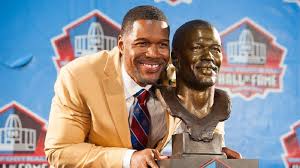They do not love that do not show their love – William Shakespeare
Among the inductees in the NFL Hall of Fame Class of 2014 was the great Michael Strahan from the New York Giants. He joined fellow inductees Derrick Brooks, Ray Guy, Claude Humphrey, Walter Jones, Andre Red, and Aeneas Williams.
Strahan is the youngest of six kids and in his induction speech he said that he is absolutely an “improbable Hall of Famer,” and an “improbable football player.” The son of a career Army man, Strahan did not grow up playing football. He received a scholarship and attended Texas Southern University where he learned to play. Another “improbable” moment later came when he was drafted by the New York Giants.
Michael Strahan played defensive end for the Giants for 15 years. He set the NFL’s single-season record for the most sacks (22.5) in 2001. He played in 216 games for the Giants and had a career 141.5 sacks (5th all-time in the NFL). His final game for the Giants came in 2007 with a win over the New England Patriots in Super Bowl XLII.
In listening to his Hall of Fame induction speech you can’t help but hear the love not just for the game of football but for the people he credits for his success. From coaches and teammates that spanned the various generations of his illustrious career, Strahan took time to recognize them all. Here are three leadership take-aways from Michael Strahan that are worthy of a closer look.
It’s not when you begin but how
Strahan trained and conditioned in Germany. He didn’t take up the game of football until college – in Texas. By that time most of his peers had considerable experience that would seemingly put him at a disadvantage. But he worked hard and learned the game and had to be teachable.
As a leader it isn’t about when you begin but how. If you work hard, are willing to learn and apply yourself, then there is no goal in your sights that you can’t reach. Your age or lack of experience is no match for a positive attitude and strong work ethic.
Improbable doesn’t mean impossible
By all accounts Strahan possessed every disadvantage imaginable when he started out. His lack of experience would surely put him at a disadvantage. Or would it? Learning and excelling at the game while in college and being drafted into the NFL was even more improbable. But he did it.
Strahan joins the company of many others who would have been labeled as “improbable” by any other standard or measurement. Walt Disney was fired from a newspaper for “lacking ideas”. Steven Spielberg dropped out of high school and applied to three film schools but was unsuccessful due to his “C” average. President Harry Truman was rejected by the U.S. Military & Naval Academies due to his poor eyesight. Michael Jordan was cut from his high school basketball team. What does Michael Strahan share in common with all of these people? He refused to be labeled and refused to give up. All successful leaders do this.
Humility is refreshing
For all the success that Michael Strahan achieved in his NFL career there is something quite refreshing about not forgetting those who helped and sharing he credit. Strahan was remarkably generous in paying homage to those who helped him. Striking in his remarks was in how he acknowledged predecessors like Lawrence Taylor and Howie Long. What was honorable was the way in which he proclaimed his love for his parents and proudly admitted to being a “momma’s boy”.
The road to success is long and hard and the bonds you forge with those around you who share the journey make it all worthwhile. When you can remain enough humble to learn, at any age or at any stage in your career, it’s a leadership quality worthy of respect and emulation.
While Strahan’s journey was on a stage for the entire world to see and enjoy it’s not unlike countless others who can and will do the same. Likely far removed from the spotlight and fanfare of a Strahan-like career, you will serve with the same degree of passion and purpose.
It’s important to remember these three lessons: it’s never too late to reach for your dreams; improbable circumstances don’t define you – they only indicate your starting point; humility is never out of style and will always serve you well. Thank you, Michael Strahan, for reminding us.
© 2014 Doug Dickerson









